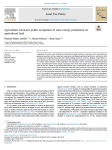Zeddies H.H., Parlasca M., Qaim M. (2025). Agrivoltaics increases public acceptance of solar energy production on agricultural land. Land Use Policy, 01/09/2025, vol. 156, p. 107604.
https://doi.org/10.1016/j.landusepol.2025.107604
https://doi.org/10.1016/j.landusepol.2025.107604
| Titre : | Agrivoltaics increases public acceptance of solar energy production on agricultural land (2025) |
| Auteurs : | H.H. Zeddies ; M. Parlasca ; M. Qaim |
| Type de document : | Article |
| Dans : | Land Use Policy (vol. 156, September 2025) |
| Article en page(s) : | p. 107604 |
| Langues : | Anglais |
| Langues du résumé : | Anglais |
| Catégories : |
Catégories principales 16 - TRANSPORT. INFRASTRUCTURE. ENERGIE ; 16.3 - EnergieThésaurus IAMM ENERGIE RENOUVELABLE ; ENERGIE SOLAIRE ; UTILISATION DES TERRES |
| Mots-clés: | AGRIVOLTAISME |
| Résumé : | Competition for land is a key challenge for decarbonized energy transitions. Open-space solar energy farms are gaining in importance but have large land requirements and displace agricultural production. Agrivoltaics offers a compromise, integrating solar panels into existing farming operations. However, adoption of Agrivoltaics remains limited, as it has lower energy output per hectare and higher installation costs than open-space solar. Here, we compare public attitudes towards Agrivoltaics and open-space solar in Germany, using experimental data from a nationally-representative sample. Participants were shown three images of a landscape that differed in terms of land use, namely an agricultural field without solar, an Agrivoltaics system, and an open-space solar system, together with some technical information. While both solar systems have perceived negative impacts on landscape attractiveness, the impacts are less negative for Agrivoltaics. In comparison to their regular electricity bill, 44 % of the participants expressed their willingness to pay more for electricity from Agrivoltaics, compared to 29 % for electricity from open-space solar. We also find a higher monetary willingness to pay for Agrivoltaics. These results hold across different agricultural systems, implying that Agrivoltaics could play an important role for socially-acceptable energy transitions. More widespread Agrivoltaics adoption may depend on targeted policy support. |
| Cote : | En ligne |
| URL / DOI : | https://doi.org/10.1016/j.landusepol.2025.107604 |







